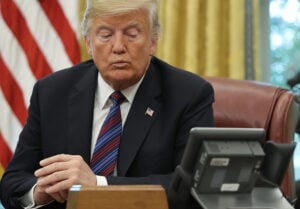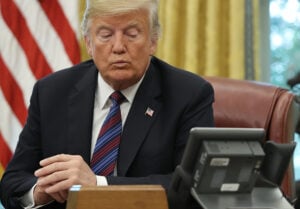[ad_1]

(Photo by Win McNamee/Getty Images)
On February 23, a full 25 days after the jury rendered its verdict in the second E. Jean Carroll defamation trial, Donald Trump’s lawyers shambled into the courtroom to ask for an unsecured stay of the judgment.
Spouting a bizarre theory that a 3.6:1 ratio of punitive to compensatory damages is excessive under Second Circuit precedent, they confidently predicted that Judge Kaplan would be overturning the jury’s $83 million verdict in post trial motions. Even more bizarrely, they claimed that Trump’s enormous wealth excuses him from having to post a supersedeas bond to postpone collections by the plaintiff.
Trump’s lawyers made no specific representations about their client’s finances, instead gesturing toward Carroll’s claims to the jury when she pressed for a high punitive damage award — the theory being that she’s now estopped from denying that he’s so fabulously wealthy that he can pay the $83 million out of petty cash without blinking.
This claim was somewhat undercut by Trump’s whining on the next page that he’ll be irreparably harmed by having to post the bond. And, as Carroll pointed out in her response, the relevant Second Circuit precedent lays out a multi-factor balancing test for assessing requests for an unsecured stay.
In that case, the appellate court ruled that Nassau County was good for the money and didn’t have to post bond in an $11.5 million award to three plaintiffs who successfully argued that their in-custody strip searches violated the Fourth Amendment. And while Trump would like to yaddayadda over the finer points, two of the Nassau County factors include “the degree of confidence that the district court has in the availability of funds to pay the judgment” and “whether the defendant’s ability to pay the judgment is so plain that the cost of a bond would be a waste of money.”
Here, as Carroll noted, the New York Supreme Court just whacked Trump with half a billion dollars in disgorgement because his company was built on fraudulent misrepresentations about his net worth. So between the cash crunch and the habitual lies about his wealth, maybe Judge Kaplan shouldn’t just take his word for it, mmmkay?
Alina Habba, Trump’s sparklemagic lawyer, responded on Friday, reiterating the claim that “Judicial estoppel prevents Plaintiff from disputing her own evidence and recent assessment of President Trump’s wealth.”
She insisted that the massive judgment in state court was somehow baked into Carroll’s arguments to the jury about Trump’s wealth, and so the fact that he’s about to have to come up with half a billion in cash is of no moment.
In her opening salvo last month, Habba asked the court to “issue a ruling on this motion no later than March 4, 2024, to allow time for President Trump to finalize arrangements for an appropriate bond if necessary.”
But March 4 came and went with nothing but this withering reminder that the defendant’s failure to plan is not the court’s problem:
On Friday, February 23, 2024, the defendant moved for an unsecured or partially secured stay of execution on the plaintiff’s judgment pending the disposition of post-trial motions. No post-trial motions have been filed yet. Moreover, briefing of the defendant’s stay motion was not completed until the late afternoon of Saturday, March 2, 2024. Nevertheless, the Court is aware of defendant’s request for a decision on the stay motion no later than today “to allow time for [him] to finalize arrangements for an appropriate bond if necessary.” Dkt 287, at 21.
A decision will be rendered as promptly as is reasonably possible. Without implying what that decision will be or when it will be made, however, it will not come today.
Without action by the court or a $91.6 million bond from the defendant, Carroll can begin collecting on March 9. But judging by the tone of this minute order, Trump better be ready to take a hammer to his piggy bank this weekend.
Carroll v. Trump [Docket via Court Listener]
Liz Dye lives in Baltimore where she produces the Law and Chaos substack and podcast.
[ad_2]




